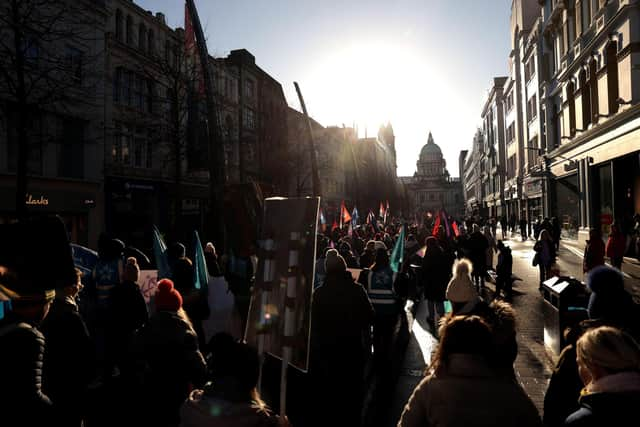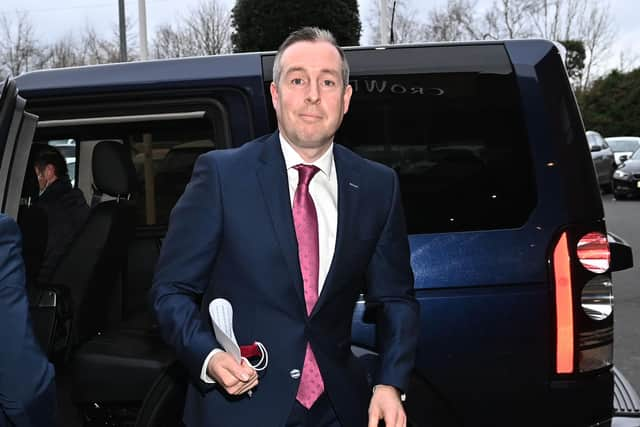Teaching unions seek 'hefty whack' pay hike as spokesman says strikes will be back on cards if upcoming talks fail
and live on Freeview channel 276
Mark McTaggart said that the demand from the roughly 24,000 teachers involved is simple: pay parity with counterparts in Great Britain, which could in practice involve a massive hike in salaries.
He was speaking after the collective he represents called off pending strike action, in lieu of talks with education officials about pay.
Advertisement
Hide AdAdvertisement
Hide AdThis followed a meeting with newly-installed education minister Paul Givan MLA (DUP, Lagan Valley) at Rathvarna Youth Resource Centre in Lisburn on Tuesday morning, which ended in an agreement for negotiations to begin “in the next few days”.


The collective is called the Northern Ireland Teachers’ Council, and is made up of five unions: the UTU, INTO, NASUWT, NAHT, and NEU (all five of which were part of the general strike last month).
Its secretary Mr McTaggart told the News Letter that strike action had been on the cards before the end of the month, with Tuesday, February 27 having been floated as a possible day of action.
This has now been suspended to allow for talks.
However, Mr McTaggart added that ever since October 2022 teachers have been engaged in “action short of a strike”, meaning things like work-to-rule and not participating in school inspections, and this will continue unabated for the time being.
Advertisement
Hide AdAdvertisement
Hide Ad

Mr Givan said: “Teachers fully deserve a fair and appropriate pay settlement, and I will work to deliver that. It is rightly of the highest priority.
“I am greatly concerned about the detrimental impact continued action is having on the education of pupils, including our most vulnerable children and young people.
“In view of this, and in the context of the opportunity before us to resolve outstanding issues, I asked the unions to suspend industrial action, including action short of strike, to allow negotiations to take place in a more positive atmosphere.”
Asked what his members are seeking, Mr McTaggart said: “We’re looking at parity with our colleagues across the water.
Advertisement
Hide AdAdvertisement
Hide Ad"If you look at a young teacher starting off, it’s the difference between £24,000 [in Northern Ireland] and £30,000 [in England]."
If you take Scotland, the gap is even wider, he said: starting salaries there are closer to £32,000.
After six years NI teachers’ pay rises to £35,300, but in England theirs goes up to £43,300, and Scotland it is over £46,000.
Is attaining parity realistic?
"Teachers haven’t had a pay rise in three years,” he said.
"If they’re serious about settling the pay dispute, we’ve always said the same thing: we need parity with our colleagues, at least parity with England.”
Advertisement
Hide AdAdvertisement
Hide AdThat will involve “a hefty whack” of an increase, “but we’re not going to announce a percentage at this point – that’ll be part of the pay talks.”
Why seek parity with GB though when cost-of-living in Northern Ireland is lower?
“The response is that we’re facing into a crisis in recruitment and retention of teachers,” he said.
“If you’ve a young teacher coming out of college with £40,000 debt, why would you stay in the north when you could go to Scotland when you could start with a considerably higher salary?
Advertisement
Hide AdAdvertisement
Hide Ad"We are struggling now even to fill all the places at the training college.
"It’s not seen as a viable option as much as it used to be.”
If the talks do not yield progress, he said, “we’d have no option” but to bring strikes back on the table.
"No teacher wants to go on strike. However, given the fact you’ve such a disparity of pay, teachers feel they’ve no option,” he said.